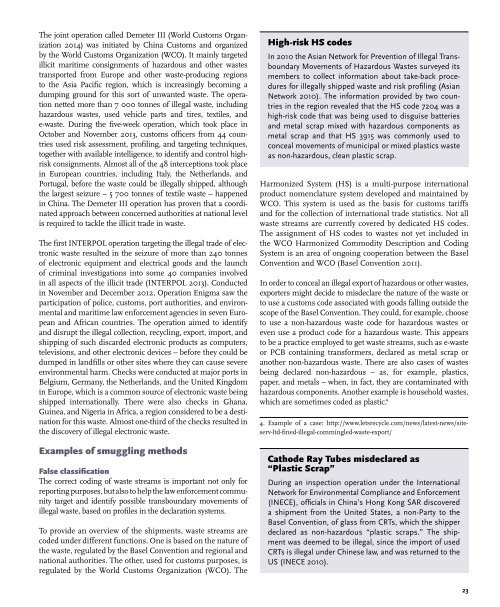WASTE CRIME – WASTE RISKS
6VhhXcA80
6VhhXcA80
Create successful ePaper yourself
Turn your PDF publications into a flip-book with our unique Google optimized e-Paper software.
The joint operation called Demeter III (World Customs Organization<br />
2014) was initiated by China Customs and organized<br />
by the World Customs Organization (WCO). It mainly targeted<br />
illicit maritime consignments of hazardous and other wastes<br />
transported from Europe and other waste-producing regions<br />
to the Asia Pacific region, which is increasingly becoming a<br />
dumping ground for this sort of unwanted waste. The operation<br />
netted more than 7 000 tonnes of illegal waste, including<br />
hazardous wastes, used vehicle parts and tires, textiles, and<br />
e-waste. During the five-week operation, which took place in<br />
October and November 2013, customs officers from 44 countries<br />
used risk assessment, profiling, and targeting techniques,<br />
together with available intelligence, to identify and control highrisk<br />
consignments. Almost all of the 48 interceptions took place<br />
in European countries, including Italy, the Netherlands, and<br />
Portugal, before the waste could be illegally shipped, although<br />
the largest seizure <strong>–</strong> 5 700 tonnes of textile waste <strong>–</strong> happened<br />
in China. The Demeter III operation has proven that a coordinated<br />
approach between concerned authorities at national level<br />
is required to tackle the illicit trade in waste.<br />
The first INTERPOL operation targeting the illegal trade of electronic<br />
waste resulted in the seizure of more than 240 tonnes<br />
of electronic equipment and electrical goods and the launch<br />
of criminal investigations into some 40 companies involved<br />
in all aspects of the illicit trade (INTERPOL 2013). Conducted<br />
in November and December 2012, Operation Enigma saw the<br />
participation of police, customs, port authorities, and environmental<br />
and maritime law enforcement agencies in seven European<br />
and African countries. The operation aimed to identify<br />
and disrupt the illegal collection, recycling, export, import, and<br />
shipping of such discarded electronic products as computers,<br />
televisions, and other electronic devices <strong>–</strong> before they could be<br />
dumped in landfills or other sites where they can cause severe<br />
environmental harm. Checks were conducted at major ports in<br />
Belgium, Germany, the Netherlands, and the United Kingdom<br />
in Europe, which is a common source of electronic waste being<br />
shipped internationally. There were also checks in Ghana,<br />
Guinea, and Nigeria in Africa, a region considered to be a destination<br />
for this waste. Almost one-third of the checks resulted in<br />
the discovery of illegal electronic waste.<br />
Examples of smuggling methods<br />
False classification<br />
The correct coding of waste streams is important not only for<br />
reporting purposes, but also to help the law enforcement community<br />
target and identify possible transboundary movements of<br />
illegal waste, based on profiles in the declaration systems.<br />
To provide an overview of the shipments, waste streams are<br />
coded under different functions. One is based on the nature of<br />
the waste, regulated by the Basel Convention and regional and<br />
national authorities. The other, used for customs purposes, is<br />
regulated by the World Customs Organization (WCO). The<br />
High-risk HS codes<br />
In 2010 the Asian Network for Prevention of Illegal Transboundary<br />
Movements of Hazardous Wastes surveyed its<br />
members to collect information about take-back procedures<br />
for illegally shipped waste and risk profiling (Asian<br />
Network 2010). The information provided by two countries<br />
in the region revealed that the HS code 7204 was a<br />
high-risk code that was being used to disguise batteries<br />
and metal scrap mixed with hazardous components as<br />
metal scrap and that HS 3915 was commonly used to<br />
conceal movements of municipal or mixed plastics waste<br />
as non-hazardous, clean plastic scrap.<br />
Harmonized System (HS) is a multi-purpose international<br />
product nomenclature system developed and maintained by<br />
WCO. This system is used as the basis for customs tariffs<br />
and for the collection of international trade statistics. Not all<br />
waste streams are currently covered by dedicated HS codes.<br />
The assignment of HS codes to wastes not yet included in<br />
the WCO Harmonized Commodity Description and Coding<br />
System is an area of ongoing cooperation between the Basel<br />
Convention and WCO (Basel Convention 2011).<br />
In order to conceal an illegal export of hazardous or other wastes,<br />
exporters might decide to misdeclare the nature of the waste or<br />
to use a customs code associated with goods falling outside the<br />
scope of the Basel Convention. They could, for example, choose<br />
to use a non-hazardous waste code for hazardous wastes or<br />
even use a product code for a hazardous waste. This appears<br />
to be a practice employed to get waste streams, such as e-waste<br />
or PCB containing transformers, declared as metal scrap or<br />
another non-hazardous waste. There are also cases of wastes<br />
being declared non-hazardous <strong>–</strong> as, for example, plastics,<br />
paper, and metals <strong>–</strong> when, in fact, they are contaminated with<br />
hazardous components. Another example is household wastes,<br />
which are sometimes coded as plastic. 4<br />
4. Example of a case: http://www.letsrecycle.com/news/latest-news/siteserv-ltd-fined-illegal-commingled-waste-export/<br />
Cathode Ray Tubes misdeclared as<br />
“Plastic Scrap”<br />
During an inspection operation under the International<br />
Network for Environmental Compliance and Enforcement<br />
(INECE), officials in China’s Hong Kong SAR discovered<br />
a shipment from the United States, a non-Party to the<br />
Basel Convention, of glass from CRTs, which the shipper<br />
declared as non-hazardous “plastic scraps.” The shipment<br />
was deemed to be illegal, since the import of used<br />
CRTs is illegal under Chinese law, and was returned to the<br />
US (INECE 2010).<br />
23


